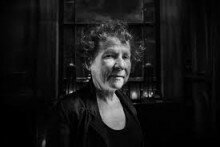
A university tutor introduced me to Ania Walwicz’s writing when I was a young student. I remember being surprised by the sustained dynamism of red roses (UQP, 1992), a book-length poetic/ficto-critical meditation on ‘becoming one’s mother’: ‘i want to write about everybody’s mother everything is becoming my mother everyone is becoming my mother all texts speak about her’ (21). I had never realised how much I had come to rely on the conventions of grammar and syntax to guide literary representations of the world. Without punctuation or chapter breaks to pace reading, one proceeds breathless through Walwicz’ text and arrives at the ‘end’ somewhat exhausted. It is Walwicz’ desire to evoke what she calls a situation of complexity, rather than a situation of ease, for her readers.
Beneath this flouting of convention, however, Walwicz’ works explore complex political, social, cultural and personal issues. Many of her prose poems in the collections Writing (1982), Boat (1989), Elegant (2013) and Palace of Culture (2014), for example, address questions of identity. As a Polish immigrant to Australia in 1963 (aged 12), Walwicz frequently touches on themes of alienation, subordination, dislocation and loss of language. In ‘so little’, for example:
Other poems explore sexual identity; in ‘Cherry’, she draws a connection between sex(uality) and violence:
And ‘needle’ suggests a complex process of stitching together self-identity:
We can take pleasure in the stream-of-consciousness with which she continually flirts, the protest against control and linearity, the sense of feeling around in the dark through language for a point of release. Her most recent book The Palace of Culture begins at this entry point:
Walwicz has kept a dream diary for more than 20 years and counts Surrealism, dream narratives, psychoanalysis and Freud in particular as some of her many influences. We note this in the fluidity of her writing style, and the sense of the language – with its slips and errors, looping and unexpected leaps in thought – being unmediated in the space between dream and page. As she has said, ‘[i]t appears that I am producing this dismembered language, but in fact I am producing language which is actual and closer to the actual process of feeling and thinking. My motto is: notation and enactment of states of feeling/being’. Ania’s poetry – or experimental prose – provides a sort of channel experience, an in-between place to revel in.
Walwicz often combines these dream-like narratives with the use of fairytale mythology as a way towards exploring self-identity. We see this in the poem ‘Little Red Riding Hood’, where Little Red is appropriated to assert a rebellion against norms of female subordination. Carnal desire is flaunted but also delightfully dangerous:
Walwicz’ writing is perennially naughty, with frequent intimations of a repressed, girlhood sexuality unleashed: ‘oh mister bear come out now to eat me’ (‘palace at 4 a.m’). But alongside the humorous, frisky undertones, Walwicz’ work also flirts with the dream as the space for the production of nightmare – a space where not only our desires, but our fears and anxieties come spilling out.
In Walwicz’ writing, the fun and the whimsical co-exist with the grotesque and the horrible; inside erupts into clear view; one fears the bear and is compelled towards the bear, and even becomes the bear. Her work represents a loop-de-loop of the psyche, where the end is not the end, but a new beginning:
In addition to her books, Walwicz’ work has been published in more than two-hundred journals and anthologies. She has performed her work locally and internationally (including a performance in Geneva alongside one of her inspirations, John Cage) and currently teaches Creative Writing in RMIT’s Professional Writing and Editing program.
Bibliography
Poetry
Writing, Rigmarole Books, Melbourne, 1982.
Boat, Angus & Robertson, Sydney, 1989.
Red Roses, University of Queensland Press, St Lucia, 1992.
Elegant, Vagabond Press, Sydney, 2013.
Palace of Culture, Puncher & Wattmann, Sydney, 2014.

